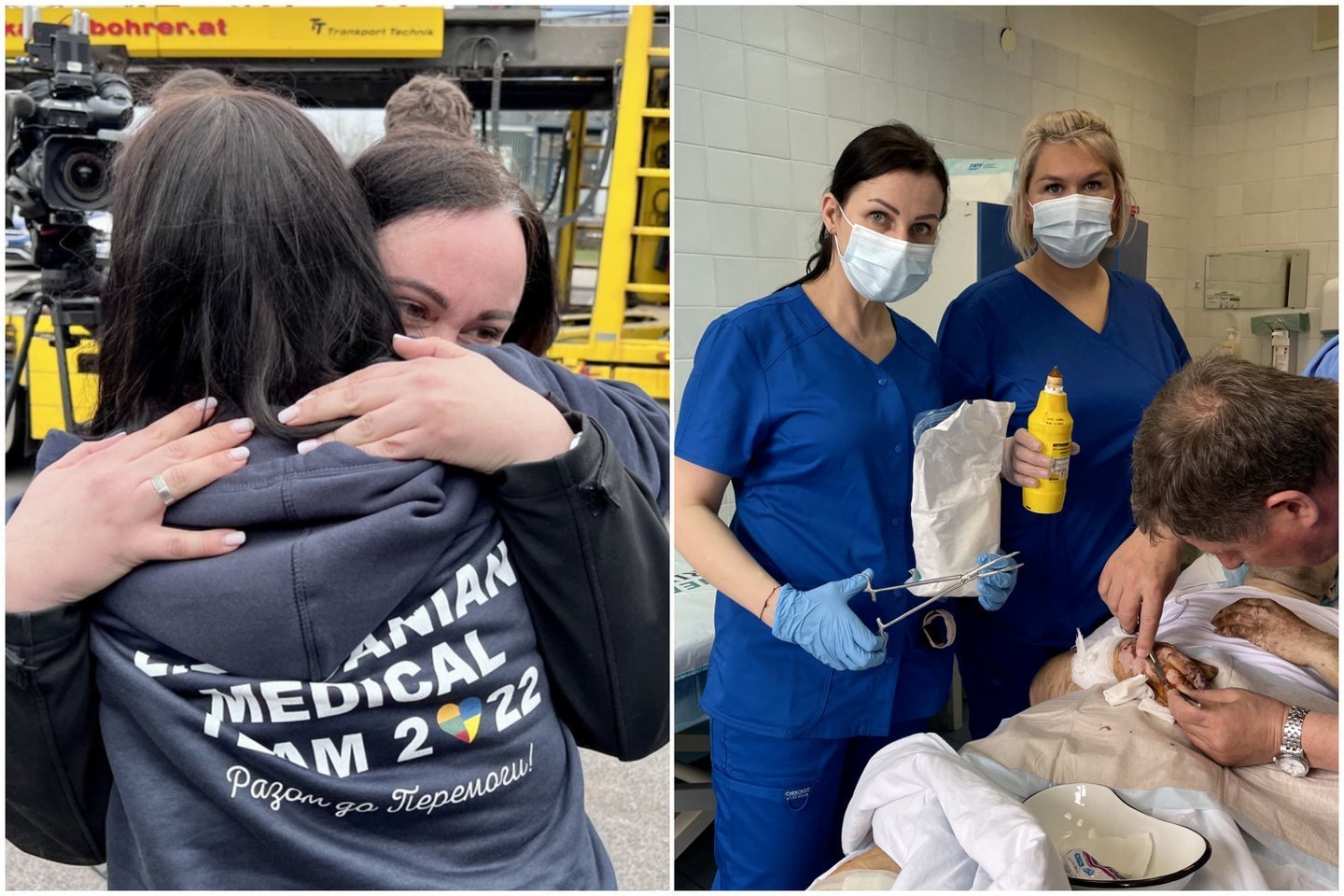Twenty-four doctors and nurses from all over Lithuania went to Kyiv to treat Ukrainian patients just before Easter – but now they are moving away from the capital towards the southeast of the country.
The specialists interviewed by the news portal lrytas.lt do not hide the fact that they did not know exactly what they were going to see when they went to visit the war-weary people, but now they have no doubt that such a move was very meaningful and necessary.
It is not always easy to tame emotions
Onė Bartkienė, an intensive care nurse at Santaros Clinics, said that despite the pain and sadness that constantly surrounds the people of Ukraine, she is very happy to help them.
„I feel very much needed by the staff and the patients – because I was driven by the desire to help and volunteer, I am very happy that I made this decision. I was a bit scared about what I would see when I came here, but I have managed my mental health very well, and I feel very good. And I tell my family and relatives that I am very happy,“ she admitted.
Bartkienė said that she was already used to negative emotions – according to her, such things are quite common in medical work, but in Ukraine, she had new feelings.
„I have been working in intensive care for 15 years – I have seen a lot of sensitive situations, and I no longer experience patients' pain the way they do. I don't have to do anything special – just a simple relaxation after work helps me to avoid those negative emotions using my professional practices. But there are a lot more emotions here than in my job, which I am used to – there have been tears, I have cried in front of a patient.
It was just basic post-operative pain in a patient, and the patient is young and very sensitive. He cried, so I cried with him. But you turn around, get a grip on yourself and go on,“ O.Bartkienė told lrytas.lt.
Bartkienė Bartkienė, a nurse who went to Ukraine, is currently working in the traumatology department – as she explained, there is no specific work schedule here, and working hours are dictated by the situation and events of the day.
„When we arrived in Ukraine, we were immediately split up – I am an intensive care nurse and my colleagues and I were assigned to the intensive care unit, but when we got there, we saw that there was not a lot of work to be done, so we just wouldn't be very much needed there. Then the medics identified that another ward needed more help, so a few of us are working in the trauma ward, where there are fewer nurses at the moment. We are assessing everything according to the situation,“ said O.Bartkienė.
Asked whether she is not worried about her own safety in a war-torn country, she said that a cool head allows her to remain alert even in more difficult situations.
„The feeling when the sirens are blaring is not the best. No one here can say we feel safe, and you just get used to the sirens. It's not that you wait for them, but you expect them any time.
We always have our retreat backpacks with survival supplies, and we have the cold mind that we need to watch out, but there has never been a situation where we have had to lose our way or panic. I hope not,“ she said.
Ina Šilingova, a nurse at Santaros Clinics, who also works in the traumatology department, admitted that when she went to Ukraine, she did not know what to expect, but the main goal was only one – to help.
„Now I feel more positive emotions, and I think we are doing our mission really well. It was a bit of a thrill because it's still another country. It's a war.
But every day is memorable for me, and I will never forget every day I spend here. If there are more missions like this, I will be there 100% because I think we are where we are needed the most,“ she said.
Paulius Razmys, anaesthesia and intensive care nurse at Santaros Clinics, said that the work in Lithuanian and Ukrainian hospitals is somewhat different, but the Ukrainian doctors welcomed the Lithuanians very hospitably.
„It is not so easy to get into the Ukrainian health system, but they welcomed us. It is also a very strong emotional support, which, it seems, cannot be seen or measured directly, and they were very welcoming.
I work in the operating theatre myself, and there are two teams of us there. You have to understand what the situation is like in Ukraine right now – one thing is that the basic equipment is different, the same anaesthetic machines, the same monitors. There is also the documentation, which is written in Cyrillic, which I do not read very well. These are nuances that make it impossible for us to work independently. Another thing is the lack of tools. There is a very big saving on tools because you don't know when you will get them again“, the nurse said.
However, one thing he finds difficult emotionally as well – sometimes it is just hard to accept the gratitude of wounded and sick Ukrainians.
„When you see someone who is injured, and they say 'thank you'. They thank you so sincerely, with tears, but I myself want to thank them for letting us help. Ukraine is now fighting a war for the whole of Europe, and I do not feel that they should thank me. It is I who thank Ukraine and its soldiers for fighting now. I don't feel I deserve it,“ admitted Mr Razmys.
They constantly motivate each other
Although Ukrainians in hospitals face not only physical but also emotional health problems, O.Bartkienė noted that Ukrainians are encouraged just by the fact that Lithuanian medics are already by their side.
„They are learning Lithuanian, they say a few Lithuanian words, or they come and say 'good morning' to us because someone else has already taught them. They know that Lithuanians work in this hospital, and they are very happy about it.
They are perhaps even happier not because we help them physically, because either way, someone will help them, but more because of our presence and support – they give us gifts, badges, and even name coins,“ – shared a nurse working in the traumatology department.
I.Šilingova said that the positive atmosphere in the hospital is also created by the fact that the team of Lithuanian medics is very united.
„The patients receive us very well, and they are grateful to our medics and our country for helping them and providing humanitarian aid. Everyone greets us with a smile. Every day we come to visit the patients, we talk to them, we joke with them, we bring them gifts and chocolate. We have a very good relationship with both the staff and the patients. Despite the pain of what is happening in their country, they try to squeeze out that little bit of positivity.
Our team is quite well-formed. We support each other, and we are together everywhere. We don't get lost, so we are like one strong fist. You can talk to any member of the team at any time if you are worried about something,“ she said.
According to the nurse, there is a lot to learn from Ukrainians.
„There is a war going on in their country, and they are trying to keep that positivity somehow. That's roughly how I imagined them, that they might feel the anxiety, but they still squeeze out a smile,“ she shared.
For his part, P.Razmys, anaesthesia and intensive care nurse at Santaros Clinics said that he had no idea how strong the emotional support of Lithuanians would be in the hospital.
„When we arrived at the hospital, there was a meeting where we discussed who could do what, who could pay what, and the first thing that the Ukrainian doctors mentioned was that they needed psychologists first. And only after that do they mention nurses, surgeons or other specialists. We did not expect this. Many people cried, there were emotional breakdowns, and it is very important for Ukrainians to know that they are not alone.
Sometimes we are not physically there to help so much, we can just take someone somewhere, but that alone is a very big emotional support for them“, shared the specialist.
According to Mr Razmio, he is not „haunted“ by negative thoughts, and this is also due to the great support and motivation of Ukrainian doctors.
„Their willingness and attitude motivate us a lot – when you see that they don't question anything and just do it even though they are tired. There is no such thing as working days here – people work for days, weeks. If they are tired, they go to sleep and then go back to work in the evening. Once there was a great need for medical staff at 10 pm, and everybody came out of the house because they just had to. We motivate each other with our work.
We are in a region where people from the hotter parts of Ukraine are fleeing – there are twice as many people living here now as there were in peacetime, so there are automatically more health problems,“ said the medic.
The Minister of Health, Arūnas Dulkys, said that Lithuanians are not going to fight a simple disease but the disease of irrationality.
„It is a pity that all major pandemics in the world are accompanied by wars – this was the case a hundred years ago when the Spanish flu was accompanied by the First World War. Now we are seeing something very similar,“ the Minister announced.
The medical profession is determined to fight the „virus of aggression“ that is sweeping humanity, he said.
„Our team is not only going to treat but also to fight this virus of aggression – we have been fighting the coronavirus for almost two years, but we are seeing what a virus of aggression can do in 50 days.
I believe that our doctors will help build a new Ukraine, which the Ukrainian people and patients are looking forward to with great optimism“, said A. Dulkys.

